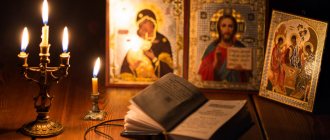The Lord's Prayer: what helps?
Researchers of human nature have long noted the fact that a person, sometimes completely unconsciously, feels the need for prayer. Even atheists and agnostics resort to prayer at critical moments in their lives.
A person remembers the prayer “Our Father” when he feels the need to communicate with the only all-forgiving and all-understanding Friend.
“Our Father” (other names: “Lord’s Prayer”, “Prayer of the Faithful”) is considered a universal prayer that is appropriate to read in any life circumstances, regardless of the time of day and place of prayer. By and large, this prayer
- helps a person to understand both his individual needs and reality,
- leads to repentance and gives a feeling of forgiveness,
- awakens faith and hope,
- helps overcome fear, tension, anger,
- helps to understand the prospects for overcoming problems,
- defines goals and helps you concentrate on achieving them,
- restores psycho-emotional state,
- produces a general therapeutic effect.
The wisdom of adhan and the history of its origin
The adhan contains multifaceted wisdom: it notifies Muslims of the time and place when and where prayer will be performed, it encourages believers to perform prayers collectively, and it also motivates careless Muslims by reminding those who have forgotten about it to perform prayer. prayer is the greatest mercy of Allah.
The call was legalized in the first year of the Hijri, since at that time there was an urgent need for some kind of sign to be installed that could inform believers that the time for prayer had arrived. At first, the Muslims did not come to a common decision, but as night fell, Abdullah ibn Zeid was sent a dream in which he saw a man carrying a bell. Abdullah asked him if he was carrying that bell for sale, and the man answered his question with a question, asking what Abdullah was going to do with this bell, to which he said that with the help of this bell he would call believers to prayer. The man who carried the bell offered to teach him something more useful, and taught Abdullah the adhan and the iqama. The next morning, Abdullah went to the Prophet Muhammad ﷺ and told him ﷺ about his dream, to which the Messenger of Allah ﷺ testified that the vision was true and he should convey these words to Bilal, since he has a more sonorous and suitable voice for this.
Adhan, truly, has a number of advantages: everything that the muazzin’s voice achieved will testify for him on the Day of Judgment before Allah - be it a genie, a person or any living creature. Its virtues are so great that if people knew about it, they would enter into competitions for the right to make the azan, as the Prophet Muhammad ﷺ said.
Prayer “Our Father like You”: interpretation, power of prayer
The prayer is divided into several parts:
- call,
- seven requests;
- vocabulary.
Call : with the words of call, believers turn to the Lord and ask to listen to their requests.
Invocation in the Lord's Prayer
The first request : for help to live in accordance with the commandments of true Christians.
The first request in the Lord's Prayer
The second request is: to honor believers with the Kingdom of God in their earthly existence.
Second request in the Lord's Prayer
The third request emphasizes a person’s readiness to accept any of His will absolutely resignedly and submissively.
The third request in the Lord's Prayer
Fourth request : for daily bread. In this case, the concept of “bread” includes everything necessary for human life on earth: food, clothing, a roof over one’s head. And also the Sacrament of Holy Communion (without it there is no salvation and no eternal life).
The fourth request in the Lord's Prayer
Fifth request : for forgiveness of sins. True believers know that He gave people enough strength and talent to do good, but people often turn these gifts into evil. And if a person does not forgive those who have offended him, then he may not receive forgiveness for his mistakes.
The fifth request in the Lord's Prayer
Sixth request : protection from temptation. After all, a person is weak enough and cannot avoid temptation.
The sixth request in the Lord's Prayer
The seventh request is for protection from all evil in this world.
The seventh request in the Lord's Prayer
At the end of the prayer, a dictionary may be read.
Why three, twelve and forty, and not twenty-eight, nineteen and some other number?
The numbers three, twelve and forty have a special, symbolic meaning in our Church. Three is the number of the Holy Trinity and a symbol of completeness. Twelve is the number of the tribes of Israel, the number of the apostles. Forty is the number of days of the Great Flood, the same number of years that Moses led the Jewish people through the desert. The Savior fasted in the desert for forty days; He spent the same amount of time on earth after the Resurrection.
Repeated repetition of prayers is necessary so that we understand what we are actually asking for. People who consider themselves spiritually successful sometimes ask for some strange gifts - the gift of tears or insight. Others are so busy worrying about pressing problems that they ask only for solutions to them. Unfortunately, both the first and second forget about the main thing - salvation.
More repetitions of prayers are needed so that we collect scattered thoughts. It is for this reason that the practice of saying the Jesus Prayer has become very deeply integrated into the lives of monks. It is short and does not allow the thoughts of the worshiper to run away. So, if we are not reciting prayers, but actually trying to pray, repeating short prayers helps our mind focus.
Also, by repeating prayers, Orthodox Christians share their joy. An example of this is the repeated repetition of “Christ is risen from the dead” and “having seen the Resurrection of Christ.” We cannot help but rejoice, because Christ is Risen, hell is defeated, there is no death! We may be asked: why not, if people die every day? Yes, this is true, but now we know that death is not the end of life. In this regard, I remember the inscription on the grave of one girl who belonged to the first Christians: “She is alive.”
By the way, if you trace what the burial culture was like in the pre-Christian era and what it became after the coming of Christ into the world, you will notice a colossal difference. In ancient times, the dead were “resettled”, cemeteries were moved outside the boundaries of the settlement, “cities of the dead” and necropolises were created. And what do we see centuries later? Every city has cemeteries. Christians believe that there is no death that separates us from God. Everyone understands: after the end of earthly life, he does not go to Sheol, but goes into the arms of a loving God, Whom he has loved all his life. That’s why we rejoice so much at Easter services. We repeat the good news - and give the opportunity to hear it to those who may not have heard it yet.
The prayer “Hallelujah, hallelujah, hallelujah, glory to you, O God” is also a manifestation of our joy and gratitude. The very word “hallelujah” means “glory to you, O God.” It turns out very interesting here: we pray with a borrowed word, and immediately explain it - we pronounce the translation. Why is that? Because not all Christians knew and know foreign languages, but we need to pray together.
When and how correctly and how many times should one read the Lord’s Prayer?
The first and most important rule: you need to pray sincerely.
Quote on the need for sincere prayer
Home prayer:
- read in the morning (after waking up) and in the evening (before going to bed), as well as before eating. Minimum - morning and evening;
- if there are icons at home, pray in front of them,
- before praying, be sure to ask for forgiveness for your sins,
- be sure to listen to the words you pronounce, be aware of them,
- never pray for material benefits or punishment for another person. Such a prayer will not be heard.
Prayer in church:
- You can come at any time when the temple is open, or you can pray during the service.
Azan conditions
In order for azan and iqama to be considered valid, the person who makes them must comply with a number of conditions:
- to be a Muslim;
- a man (a woman is not allowed to perform the adhan, but she can read the iqamat quietly);
- must be of sober mind and reason;
- the order of words must be observed, and the words themselves must be pronounced continuously, without a long break;
- performing adhan when the time comes for prayer;
- sounds must be pronounced clearly, and the text itself must be stretched as required by the relevant rules of the Arabic language;
- when performing azan, it is prohibited to chant it excessively, especially if this leads to the letters, characters changing, or if this leads to the addition or subtraction of sounds;
- the azan and iqamat performed by a minor, but discriminating mumayiz boy (that is, already distinguishing between men and women) will be valid;
- Also, the call will be valid if a person overslept the time of prayer or forgot to perform it on time.
Sunnah when reading adhan and iqamat
Desirable actions when performing adhan and iqama include:
- It is advisable to pronounce them while standing, but it is undesirable to read them while sitting if it is possible to do so while standing;
- muadzin must face the Qiblah;
- the reader should be in a state of small and complete ablution;
- it is undesirable to walk around the minaret while making a call, although this does not apply in cases where the city is large;
- When the muezzin is about to proclaim the call to prayer, he should stand on a hill, preferably a minaret. If there is no minaret, it can be recited from the roof of the mosque. Nowadays, loudspeakers are installed on the roofs of mosques, and muezzins can read the adhan in the mosque while standing. If the loudspeaker is faulty or the power is cut off, the muezzin must follow the rules stated earlier;
- adhan and iqamat should be proclaimed to the same person;
- It is desirable that the muadzin have a beautiful and loud voice;
- Iqamat, unlike azan, is pronounced quietly; there is no need to climb to a height. This should only be done when there is a possibility that not everyone will be able to hear the iqama;
- Between the azan and the iqama, time must be extended so that the believers can complete the sunnat prayers and gather for prayer.
How the Lord's Prayer helps in life: examples
Unfortunately, it is easier for a person to believe in bad things than in good things. In the case of prayers, things are even more complicated: often we don’t even know when exactly prayer helped us.
And even in this case, you can find many examples of how sincere prayer helps fight physical illness.
How the Lord's Prayer helps in life How the Lord's Prayer helps in life
And this incident occurred in 2016, when a plane heading to the Dominican Republic was forced to make an emergency landing.
How the Lord's Prayer helps in life
Words of Iqama
Iqamat in Arabic
Form of Iqamat according to the Hanafi madhhab: “Allahu akbarul-laahu akbar (2 times). Ashhadu alla ilaha illallah (2 times). Ashhadu anna muhammadar-rasulullah (twice). Haya 'ala ssolya (twice). Haya 'alal-falayah (twice). Kad kamatis-salatu kad kamatis-salatu. Allahu akbarul-laahu akbar. La ilaha illallah.
Listen to the Iqamat of the representative of the Istanbul Muftiate Erhan, according to the Hanafi madhhab:
Words of the Ikamat according to the Shafi'i madhhab: Allahu akbarul-lahu akbar. Ashhadu alla ilaha illallah. Ashhadu anna muhammadar-rasulullah. Haya 'ala pissing. Haya 'alal-falayah. Kad kamatis-salayatu kad kamatis-sala. Allahu akbarul-lahu akbar. La ilaha illallah."
Listen to the Iqamat as read by Muhammad al-Luhaydin according to the Shafi'i madhhab:
Translation into Russian: “Allah is Great, Allah is Great. I testify that there is no god but Allah. I testify that Muhammad is the Messenger of Allah. Hurry to prayer, hurry to salvation. Get ready to pray, get ready to pray. Allah is Great, Allah is Great. There is no god but Allah."
Azan in modern culture
World culture is extremely diverse, with completely different directions intersecting in a bizarre way. It is not uncommon for some religious motifs to be found in modern music. However, spiritual chants always stand apart, and the best adhans belong precisely to this category.
Muslims are proud that they were able to enrich the treasury of cultural heritage, but they do not allow their chants to be distorted in any way or used inappropriately. It is no coincidence that in April 2022, a British DJ was sentenced to a year in prison for launching a remix of the Muslim adhan in a Tunisian club.
Nowadays, the calls to prayer announced by the recognized reciter of the Qur'an, Mishari Rashid al-Afasi, are highly valued. Recordings of his calls can be found on the Internet; these are truly spiritual chants performed at a professional level. He himself preaches in one of the mosques in Kuwait and performs the duties of an imam there.
Today, calls, even being deeply woven into Islamic rituals of prayer, can be considered a separate cultural trend. If you want to understand the beauty of these chants, you can watch the adhan video. It is worth not only listening to the muezzin’s voice, but also looking at the expression on his face while pronouncing the call to prayer in order to understand the meaning of any call and how much it can influence the soul of any person.
Cleansing the aura with the prayers of Lucien Chamballani
Lucien Chamballani was born in Ukraine, where he now lives. He loves his homeland and the island of Khortitsa, considering it an inexhaustible source of his inspiration.
As you know, the composer began writing music at the age of 6. His mother is a professional pianist, his father plays the guitar, and his grandparents’ activities are also closely related to musical creativity. The composer's grandfather was an opera singer, and his grandmother in her youth was fond of playing the mandolin and balalaika.
According to the author, his work is intended to restore mental balance, harmony in the soul and with the Universe.
Lucien is one of the few composers who gives away his music for free. All his compositions are widely available to the people. Anyone who wants to listen to the author’s compositions can listen to the works for free.
Number and time of announcement
The Muslim prayer cycle consists of five obligatory prayers. Every believer must read the prayer:
- in the morning;
- at noon;
- shortly before evening;
- In the evening;
- at night.
Accordingly, before each prayer a reminder must be said, so the adhan schedule coincides with the schedule of the prayer itself, although they are separated by a few minutes to prepare directly for the prayer. However, there are periods when prayer is prohibited. In particular, when the sun is at its zenith, the call and prayer are not read.
There is also a ban on reading the call at a time when the sun has already risen, but has not yet risen to the height of the spear. You should also not read prayer when the sun is setting. Particularly zealous Muslims may
Rules of conduct for believers
It should not be assumed that Muslims who come out to listen to the call should simply perceive it as a reminder to begin prayer. After all, the azan is a component of the prayer ritual, which means that a certain response and action is required on the part of the listeners.
The rules dictate that these words must be responded to immediately, putting aside all the things that a person is busy with at the time. Even if at that moment you are reading the Koran, at the sound of the call you need to interrupt what you are doing. And the point is not only that from this moment you begin to internally prepare for prayer, but that you need to repeat after the muezzin - and this requires a certain concentration.
By pronouncing the words, a person feels how the adhan calms the soul. All these phrases must be repeated exactly as the person calling them says. But there are two exceptions. When you hear the words “There is no other god but Allah,” you must answer, “Only Allah is strong and omnipotent.” And when the morning call time comes and the muezzin reminds: “Prayer is better than sleep,” believers must answer: “Truly these words are true.”
Thus, the announcement of prayer is read by both parties - both the one who announces the call to prayer and the one who listens to the announcement. All this allows a person to tune into a prayerful mood and perform namaz after adhan with inspiration and true humility. Moreover, if you are far away (for example, on a trip) and know that the time for prayer is coming, then you need to read the call yourself and only then start praying.
In Islam there are a number of rules that must be strictly followed. This applies to all aspects of the life of a devout Muslim, and the adhan is no exception. Since performing namaz is a component of the pillars of Islam, prayer and call are closely related, and therefore require compliance with established requirements.
- A woman cannot read the adhan; this is only allowed for a man. In this case, the announcer must be exclusively Muslim. If there is no man and only women have gathered for prayer, then instead of the azan they can read the iqamat.
- It cannot be said while sitting, and those who listen should not talk while these words are being read, much less laugh. The Iqamat is read, as a rule, by the same person who called for prayer, although this is not a mandatory requirement. But if you are in a mosque while reading the call, the call to prayer does not need to be repeated after the muezzin. However, reading the Iqama is mandatory in any case.
- When announcing the call, the muezzin must cover his ears with his index fingers (according to another version, he should hold his earlobes with his index finger and thumb). This is required in order to raise your voice. When saying “Hurry to prayer,” he must turn his head to the right, and when saying “Hurry to your salvation,” he must turn to the left.
The rules say nothing about how pure the person listening to the call must be. But at the same time, the one who announces the adhan must undergo purification in advance. After all, these words call for spiritual purity, so he is obliged to notify only after ablution.
In Islam, the azan is often seen not only as a call and reminder of prayer, but also as a kind of amulet against many misfortunes. Therefore, the call replaces both a conspiracy against troubles and a good parting word that can attract good luck. In particular, it can be read in the back of a person leaving you, as well as during a battle or fire. These words calm an aggressive person or animal and treat nervous diseases.
Many Muslim parents believe that reading the call to prayer can protect their child. Therefore, in Muslim families you can often see how the iqamat is read into the left ear of a newborn, and the azan into the right ear. Islamic hadiths record that this is exactly what the daughter of Muhammad (s.a.w.) Fatima did for the first time. When her son Hasan was born, she read him the azan.
Cleansing the body shell
Sometimes circumstances in a person’s life begin to develop in such a way that one gets the impression of an ongoing black streak: depression, fatigue appear, interest in what one loves is lost, various diseases and ailments arise. The reason for this situation is clear and simple - breakdowns in the human biofield.
When diagnosing a damaged aura and its energy centers (chakras), we can come to the following conclusion: if an individual experiences failures and problems, the fault is due to damage to the biofield. There is no need to think that the person is damaged. This is not entirely true. A hole in the aura occurs due to involuntary negativity towards a person, surgical intervention or severe stress. In this case, you can turn to a psychic or cleanse the aura with prayer - on your own.











